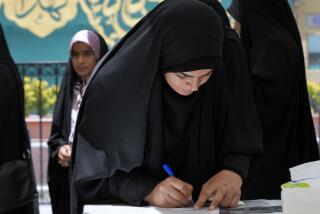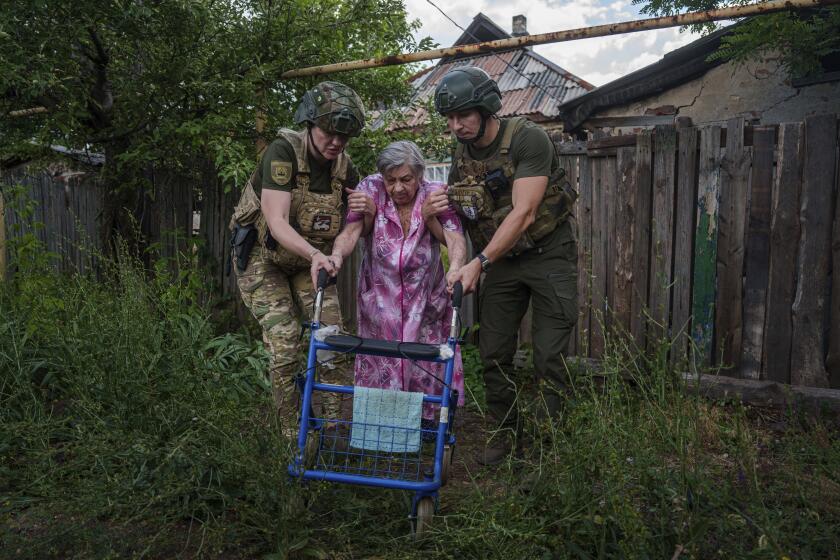Media : Lampoon Is No Joke to Croatia’s Rulers : * The Feral Tribune finds humor amid poverty, war and oppression. But the government isn’t laughing.
In a country bisected by armed rebels, impoverished by war and suffering under increasingly authoritarian rule, it would seem there was little to laugh about.
But no subject is too serious and no public figure too esteemed to escape the biting satire of the Feral Tribune, a weekly lampoon on life in Croatia that has evaded the sweep of state media takeovers and rocketed to popularity among people who have tired of official truths.
Despite the government’s iron grip on most media and outright intimidation of critical journalists, the 10-year-old Tribune has so far outmaneuvered its official adversaries and helped Croats find black humor amid misery.
One recent issue parodied the Croatian army’s penchant for confiscation of private apartments by reporting that President Franjo Tudjman had been turned out. Photographs were doctored to show the head of state, in his pajamas, being booted out the front door of his official residence and sitting dejectedly on the steps with his wife, bags of belongings piled around them.
Army excesses in the war in neighboring Bosnia-Herzegovina inspired the most controversial issue--one that has landed the newspaper’s chief editor in a military training camp and provoked a tense showdown between the government and international advocates of a free press.
A photo montage on the cover of the first edition of 1994 showed Tudjman cuddling in bed with Serbian President Slobodan Milosevic, a symbolic reference to the reported deal between the Balkan arch-enemies to settle their overlapping land claims by brutally dividing independent Bosnia between them.
The headline asked readers: “Is this what we fought for?”
Less than 24 hours after that issue hit the streets and immediately sold out all 50,000 copies, Tribune editor Viktor Ivancic was served with a mobilization notice by the Croatian army and taken off to a military barracks, off limits to civilians.
“His mobilization was obviously related to that issue,” said deputy editor Boris Dezulovic. “We believe they planned to send him to the front lines in Bosnia, but after all the noise this case has raised, they have left him in the barracks instead.”
Ivancic was one of about 3,000 Croatian citizens of Bosnian birth summarily conscripted by the Zagreb government over the past month. Most have been sent to join Bosnian Croats in their fight against the Muslim-led government forces--an act of armed interference in a neighboring country prohibited by Croatia’s own constitution and the subject of much ridicule in recent issues of the Tribune.
International organizations devoted to promoting press freedom have leaped to the editor’s defense.
Former Polish Prime Minister Tadeusz Mazowiecki, the special U.N. human rights envoy, has added his voice to that of the European Parliament, Helsinki Watch and an array of pro-democracy groups in protesting the Croatian government’s obvious attempt at censorship.
But another deputy editor, Predrag Lucic, predicts the leadership won’t back down--yet.
“Whenever the government makes a wrong step, they somehow don’t want to go back and make the right one,” he said of official moves against critical media. “They stay on that wrong leg until after the noise abroad goes away.”
*
While the loss of Ivancic has added to the workload of the remaining editorial staff of 10, Lucic contends the attempt to silence the paper has backfired and elevated the underdog weekly to hero status.
The military detention of Ivancic was not the first move to stifle the Feral Tribune, a name intended to sound like the English-language daily International Herald Tribune, which circulates in Europe.
The newspaper was a weekly supplement to the Split daily Slobodna Dalmacija until that newspaper was bought up last June by a media group owned by officials of Tudjman’s Croatian Democratic Union.
Rather than incurring the wrath of independent media organizations with outright nationalization of all newspapers, Tudjman’s party has taken advantage of a purported program for privatization in acquiring all broadcast media, all but one daily and most periodicals, save for the already independent Tribune.
The new owners of Slobodna Dalmacija refused to continue publishing the weekly, so the Tribune secured other printing and distribution services--only to be taken to court over the right to keep its name.
Ivancic’s paper won the court case, but it cost owners and backers tens of thousands of dollars in legal fees.
The suit over the name was filed immediately after another inflammatory issue last spring. It compared actual elementary school class pictures of Adolf Hitler, Josef Stalin and Tudjman--each, ironically, occupying the same position. The headline read: “Great leader, top row, center.”
The odd coincidence of their placement made readers chuckle but enraged the leadership for its suggestion that Tudjman had anything in common with this century’s greatest dictators.
Next, the government sought to categorize the weekly as pornographic, which would require a 50% excise tax on gross sales. “They wanted to break us financially,” Dezulovic said.
But intervention by foreign press groups helped pressure Zagreb authorities to reconsider the Tribune’s tax classification.
Tudjman loyalists also own most newspaper kiosks and printing facilities in the region, which has forced the Tribune into logistical gymnastics since it went independent last June.
Because no publishing house in the country wants to risk helping the renegades, the weekly’s editors have to paste up their own pages each Saturday, then drive them seven hours to Zagreb, where they can be printed and ready for nationwide distribution by Sunday night.
So far, the state-monopoly distribution network has continued to work on contract with the newspaper, but its editors suspect that service will be revoked as well if the government exhausts more subtle means of thwarting their work.
“They will try to shut us down, but they won’t succeed,” predicted Dezulovic. “We will keep printing even if we have to do it on a photocopy machine.”
Far from being cowed by the treatment of their editor, those who produce the Tribune say they are all the more inspired to speak out. “We are interested in provocation as art,” explained Lucic.
Last week’s issue featured a camouflage-clad Ivancic on the cover, crashing through mountainous brush, apparently on Bosnian maneuvers. A senior Croatian army official was shown walking the front line just behind him, and an accompanying article insisted recruitment was so difficult for the Bosnian conflict that even top government officials had been mustered.
*
Tribune journalists say they are buoyed by booming sales of their weekly, even in the face of officially inspired advertising boycotts and the muzzling of their promotional jingle by state-run Croatian Radio.
Circulation has risen from 30,000 to 50,000 in six months, and Lucic says another 20,000 copies can be sold if the staff can secure facilities to print them.
“Readers write to us to say that we help them to survive, that what we write helps them stay angry” at the system, said Lucic, who, like most of the staff, sports a ponytail and is barely 30.
Their philosophy is to go after whatever the government suggests is sacred, which has given rise to several weekly fixtures, like the interview column “Forbidden Persons.” It has featured targets of government denunciation, like writers Dubravka Ugresic and Slavenka Drakulic--banned from official mention for their criticism of the regime’s nationalist bent.
“There are no forbidden persons for us,” said Lucic, noting that the newspaper has even sought an uncensored interview with Tudjman. That is unlikely to be granted, the editors conceded.
While Lucic and Dezulovic usually pause for contemplation after questions, they laugh and answer in unison when asked if they think Tudjman has a sense of humor.
Their immediate verdict: “Definitely not!”
More to Read
Start your day right
Sign up for Essential California for news, features and recommendations from the L.A. Times and beyond in your inbox six days a week.
You may occasionally receive promotional content from the Los Angeles Times.







